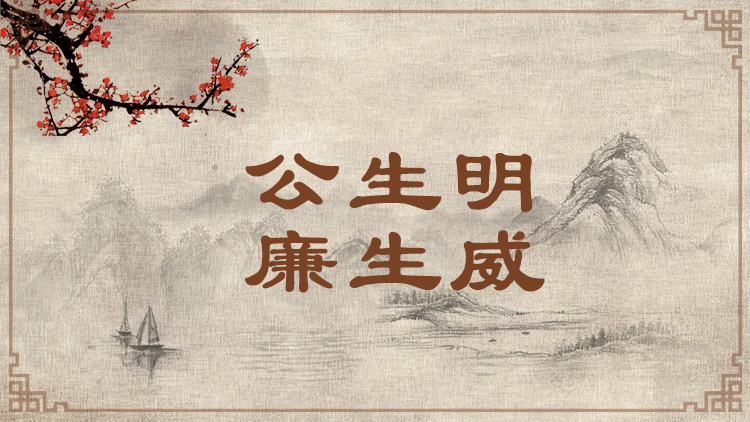Fairness Fosters Discernment and Integrity Creates Authority

处事公正才能明察是非,做人廉洁才能树立威望。这是明清两代一些正直廉洁的官吏用以自戒的座右铭。“公”即公正无私;“明”即明察是非,有很强的分辨力和判断力;“廉”即廉洁;“威”即威望,有令人信服的公信力。时至今日,它仍是执政者应当遵循的最重要的为官准则:执政当公平公正,在国家法律和规定程序的框架内进行;官员当以身作则,廉洁自律,克己奉公,不可以权谋私。
Only by being fair can one distinguish between right and wrong; only with moral conduct can one establish authority. These mottoes were used as reminders by upright officials of the Ming and Qing dynasties. Gong (公) means fairness and opposing pursuit of selfish interest. Ming (明) means discernment, namely, the ability to distinguish right from wrong. Lian (廉) means free from corruption. Wei (威) means authority or credibility. Today, these teachings have remained important principles which officeholders should abide by. They mean that governance should be exercised in a fair and just way and within the framework of laws and regulatory procedures of the state. Officials should lead by example, have moral integrity and be self-disciplined; they should put public interests above their own and not use their power to pursue personal gain.
引例 Citation:
◎吏不畏吾严而畏吾廉,民不服吾能而服吾公。公则民不敢慢,廉则吏不敢欺。公生明,廉生威。(年富《官箴》刻石)
官吏不害怕我的严厉但害怕我廉洁,百姓不信服我的才能但信服我的公正。我公正,百姓就不敢轻慢;我廉洁,官吏就不敢欺瞒。处事公正才能明察是非,做人廉洁才能树立威望。
Officials have a sense of awe towards me not because of my being strict with them, but because of my upright conduct. People accept my authority not because of my ability, but because of my fairness. If I am fair, people will not dare to disobey my order; if I am morally upright, officials will not dare to deceive me. Only by being fair can one distinguish between right and wrong; only with moral integrity can one establish authority. (Nian Fu: Mottoes for Officials, from a stone carving)
推荐:教育部 国家语委
供稿:北京外国语大学 外语教学与研究出版社
责任编辑:钱耐安





